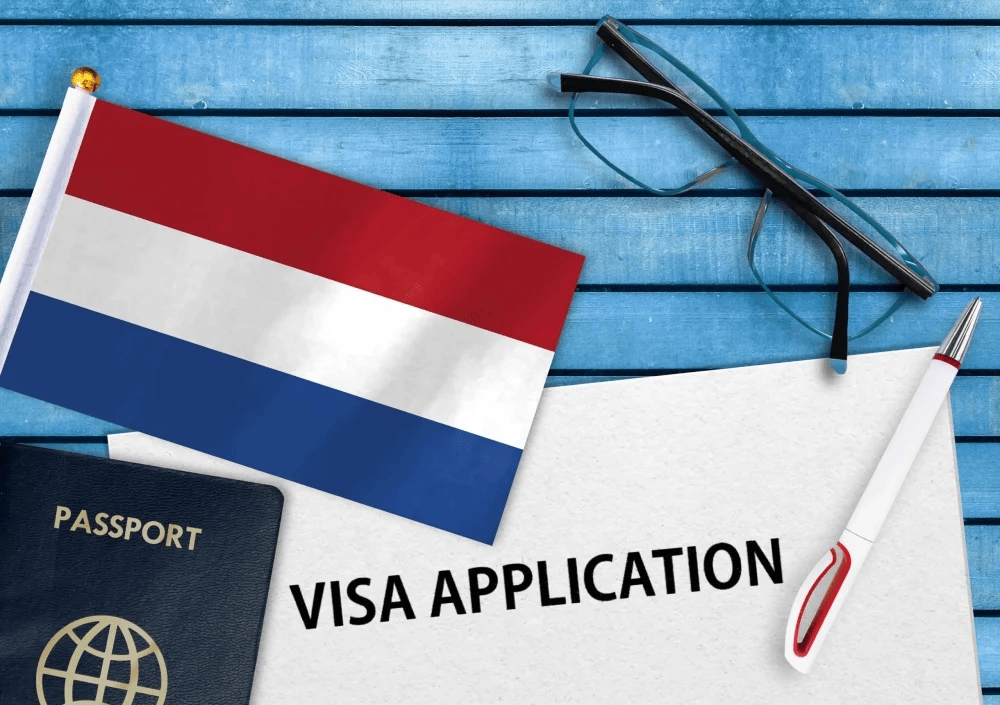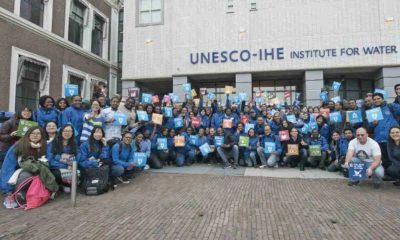Visa
How To Get A Netherlands Work Visa: Application, Documents, FAQs

If you intend to work in the Netherlands for more than 90 days, you must apply for a Netherlands work visa.
A work visa for the Netherlands is a residence permit granted to foreign nationals who seek to enter the country for the purpose of working.
In many situations, you must get a work permit in addition to your Dutch resident permit. To enter and stay in the Netherlands, however, not everyone requires a visa or a residence permission.
Who Needs a Netherlands Work Visa?
Whether you need a visa to enter the Netherlands depends on your nationality.
EU, EEA, and Swiss citizens can enter the Netherlands without a work visa/residence permit. If you wish to stay in the Netherlands longer than four months, you must register with your local personal records database and acquire a Citizen Service Number.
If you are a family member of an EU, EEA, or Swiss national, you do not require a Dutch residence permission but must have a Verification against EU Law.
All other foreign nationals need a Dutch residence permit and a work permit to live and work in the Netherlands. Some can get a Single Permit that combines employment and residence permits.
Along with their Dutch resident permit, some nations need an MVV visa (type D visa or “provisional residence permit”). If you need an MVV, you may have to take a civic integration exam on Dutch language and culture.
What are the requirements for a Netherlands Work Visa?
The requirements for a work visa in the Netherlands vary based on which of the Dutch residence permits available for work you are seeking for. There are, however, a set of standard conditions for each Dutch visa that you must meet. Then, depending on the sort of work visa you require, there will be additional criteria, as detailed in the sections below.
Types of Netherlands Work Visas
Each type of Netherlands work visa has its own set of requirements and conditions.
- For regular paid work (as an employee)
- If you want to work in the Netherlands as a regular employee (a labour migrant), you will need a Netherlands Work Visa for regular paid work.
The requirements for a Dutch regular employee work visa are:
- You need an employment contract with an employer in the Netherlands
- You need to earn at least the minimum wage for employees over the age of 23
- Your employer has to show that the position could not have been filled by a Dutch or other EU/EEA national
For seasonal labour
A Netherlands work visa for seasonal labour is granted to individuals who will be doing seasonal work in the Netherlands in the agriculture sector. A Dutch seasonal work visa can be issued for a maximum of 24 weeks.
The requirements for a Dutch seasonal labor visa include:
- Employment contract with an employer in the Netherlands
- Obtaining a Single Permit (a combined residence permit and work permit)
- You must earn the minimum wage or a percentage
Intra corporate transfer
If you work for a company in a country outside the European Union (EU) and will be transferring to a branch of that company based in the Netherlands, you will need a Netherlands work visa.
The requirements for an intra corporate transfer to the Netherlands include:
- You cannot be a national of an EU/EEA state or of Switzerland
- When applying, you must be a resident of a non-EU country
- You must be working in management, as a specialist, or as a trainee
- You must have been employed at your company for at least three months before transferring
- You have the qualifications and experience needed for your position
- Your salary must meet the criteria for working as a highly-skilled migrant
- You will be living in the Netherlands for the majority of your transfer
- There has to be economic activity between your employer and the Netherlands branch you have been transferred to
- You cannot have had a prior transfer to that company immediately before the application
- The branch you are transferring to cannot have been fined in the last 5 years for violating article 2 of the Aliens Employment Act or for not paying (or insufficiently paying) wage tax or employer insurance premiums
- Trainee employees must follow a trainee program, not a normal employee one
For a highly-skilled migrant
Highly skilled migrants are also referred to as “knowledge workers” at times. They are the foreign nationals who will contribute to the knowledge-based economy in the Netherlands. You must earn a particular amount of money to be deemed a highly skilled migrant. If you are under 30, you must earn a minimum pay of €3,299; if you are over 30, the minimum wage is €4,500.
Other requirements for a highly skilled migrant include:
- You need a contract with an employer or research institution in the Netherlands
- The employer has to be a recognised sponsor by the IND
- For scientific researchers: your employment contract is signed on behalf of the institution
- For scientific researchers: the contract must include the job description and code in accordance with the University Job Classification system (UFO)
- For doctors in training: the institute you are training in has been set out by the Medical Specialists Registration Committee (MSRC), Social Medicine Physicians Registration Committee (SGRC) or General practitioner and Nursing home Physicians
- Registration Committee (HVRC).
- For doctors in training: you must be registered with the Individual Healthcare Professions, also known as the BIG-register.
European Blue Card
The European Blue Card is a work permit that allows non-EU citizens to reside and work in any EU country save Denmark, Ireland, and the United Kingdom. You will require a Netherlands work visa and work permit to work in the Netherlands using an EU Blue Card issued by another nation. You must also fulfill the following requirements:
- Employment contract must be valid for at least 12 months
- A higher education diploma from a program of at least three years
- Your higher education certificate must be evaluated by Nuffic
- You must prove you meet the standards for practising your profession
- You must earn the required wage amount set for EU Blue Card holders: the minimum is €5,272 per month
- The branch you are transferring to cannot have been fined in the last 5 years for violating article 2 of the Aliens Employment Act or for not paying (or insufficiently paying) wage tax or employer insurance premiums
For an orientation year for highly educated persons
If you finished your studies in the Netherlands and your Dutch study visa has expired, you can request for an extension of one year to hunt for work. You can apply for a work visa in the Netherlands for three years after finishing your studies. You must have completed one of the following activities to be eligible for an orientation year:
- Completed an accredited Netherlands BA or MA program
- Completed at least one year of postgraduate studies in the Netherlands
- Have had a previous Dutch visa for scientific research in the Netherlands
- Acquired an MA degree within an Erasmus Mundus Masters Course
- Completed a higher education program that’s been designated by the Ministerial Decree
- Completed a study offered in relation to the development cooperation policy of the Dutch Ministry of Foreign Affairs
- Completed a study in the Netherlands within the Cultural Policy Act
- Completed MA or postdoctoral studies, or obtained a PhD at a designated educational institution abroad
For researchers under Directive (EU) 2016/801
In order to work in the Netherlands as a researcher under Directive (EU) 2016/801, you will have to fulfill the following requirements:
- Have sufficient higher educational background to be allowed into the doctorate program
- The Dutch research institution you’ll be conducting research in is a recognized sponsor by the IND
- The research project you will be working in has been approved by the institution
- You have an employment contract/host agreement with a research institution
- You will be receiving sufficient monthly income, either from your employer or a grant/sponsor
For self-employed individuals, freelancers, and entrepreneurs
If you intend to stay in the Netherlands to create your own business or operate as a freelancer, you can apply for a Netherlands self-employment work visa (residence permit).
The conditions for a self-employed work visa in the Netherlands are more stringent than for other types of work visas. Certain prerequisites must be met, and depending on your situation, you may also be eligible for a Netherlands “startup” visa.
How to Apply for a Netherlands Work Visa?
Obtaining a Netherlands work visa relies on your country and job.
You need a residence permit to stay in the Netherlands and a work permit to work. Some applicants can get a Single Permit that incorporates both permissions. The GVVA can be awarded for one to three years.
Your company must usually apply for your work permit or Single Permit. After receiving all the paperwork, they can do this directly to the IND. IND will then send the application to the Dutch employment agency (UWV) for review and advice.
Who can apply for a Single Permit (GVVA)?
The foreign workers coming to work in the Netherlands with a visa who apply for a single permit are:
- Regular labour migrants
- Interns
- Practitioners
- Ministers of religion/spiritual leaders
- International education teachers
- Some foreign nationals who work in the Asian restaurant industry
Who needs a separate residence permit and work permit (TWV)?
If you cannot apply for the single permit, your employer has to apply for a separate work permit on your behalf. However, either you or your employer can apply for a Dutch residence permit. If you’re applying yourself, you can do it at the Dutch embassy/consulate in your country.
Those excluded from the Single Permit are:
- Labour migrants on a short-stay visa
- Seasonal workers
- Students
- Asylum seekers
- Intra-company transferees
- Refugees
- Workers on an orientation year
- Family members of single permit holders
- Service providers
- Croatian nationals
- Seafarers






















